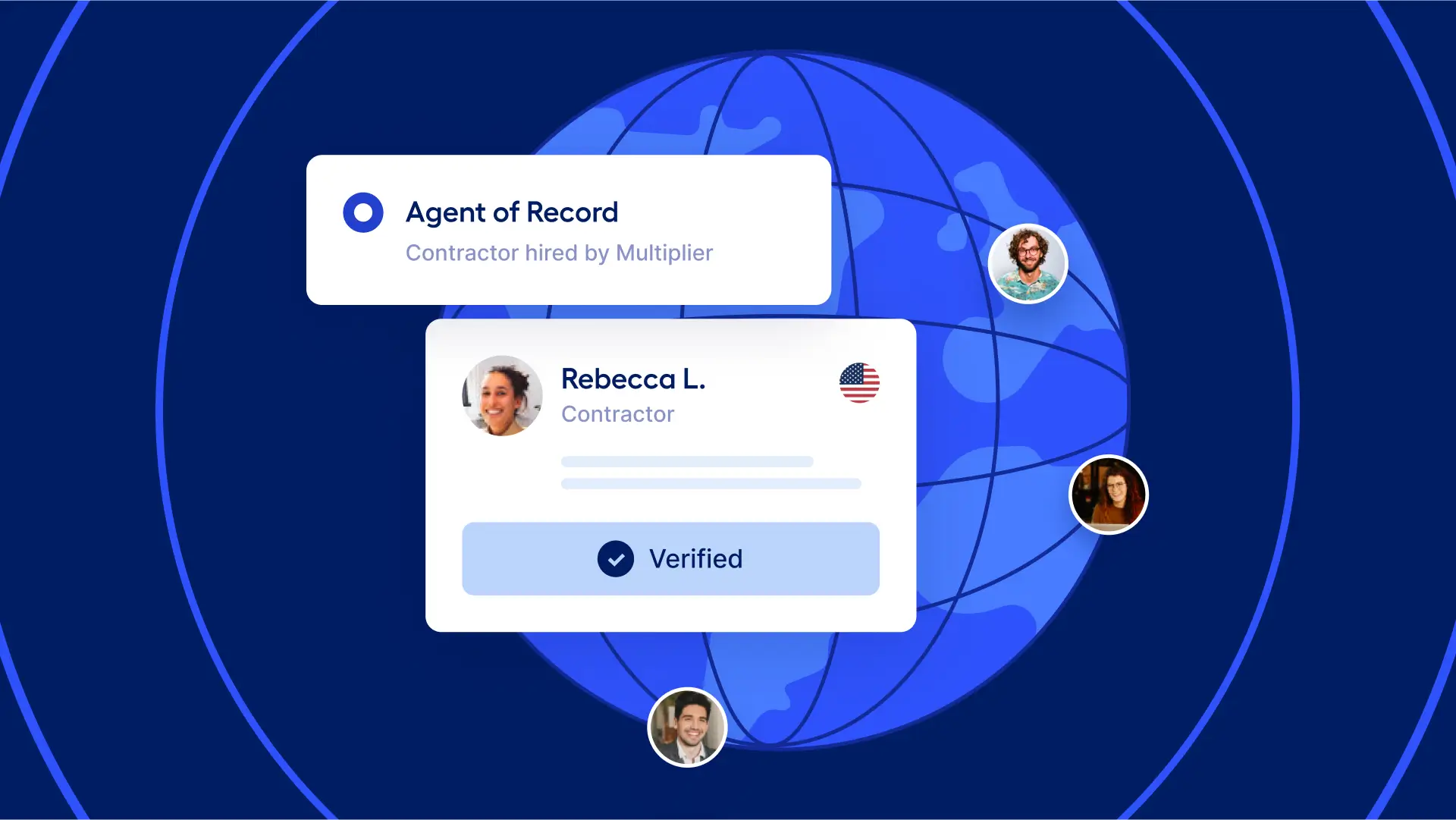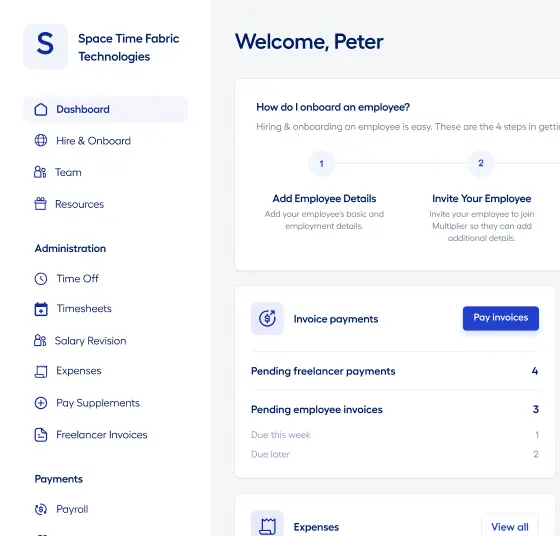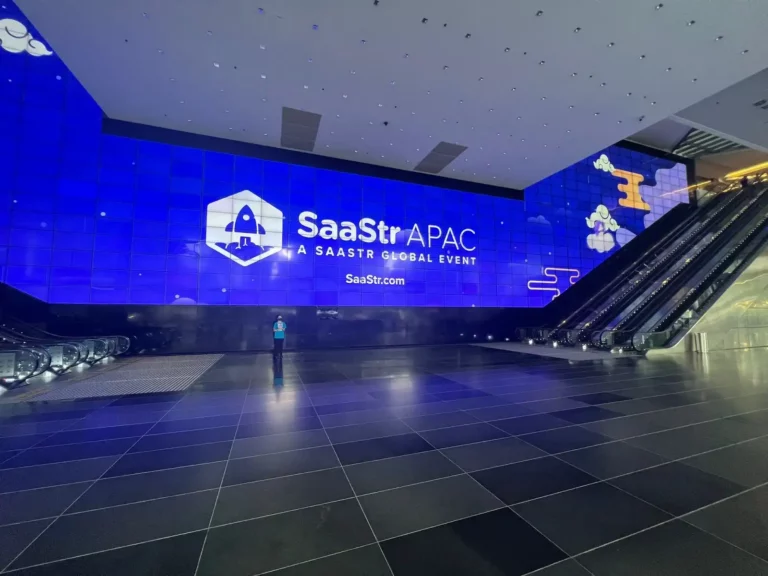An Agency of Record (AOR) is a valuable third-party service that takes care of the hiring and administration of independent contractors, guaranteeing full compliance. By partnering with an AOR company, businesses can rely on their expertise to properly classify and compensate contractors.
The concept of an Agency of Records has roots in the advertising industry, where companies would designate a specific agency to manage all their advertising needs. This model has evolved to encompass other business functions like human resources, particularly with the rise of global workforces and remote work.
Multiplier’s agency of record is an example that illustrates this evolution well, focusing on managing international workforces for businesses all over the world. As your Agency of Records, Multiplier helps facilitate independent contractors’ onboarding and payment process, ensuring compliance with worker classification and legal agreements.
By entrusting Multiplier’s AOR with these responsibilities, businesses can concentrate on their core operations while ensuring the effective and compliant management of their international workforce. This empowers organizations to streamline their operations and optimize efficiency.
What does the AOR process entail?
When it comes to hiring independent contractors and managing their engagements, the expertise and services of an Agent Of Record (AOR) are truly invaluable. AORs have an extensive understanding of worker classification laws in different states and countries, guaranteeing that businesses engage legitimate independent contractors and avoid mistreatment as remote employees.
Here are some of the crucial aspects an AOR will take care of:
1. Independent Contractor Classification
An Agent of Record (AOR) possesses the expertise required to stay updated on the intricate details of worker classification across different states and countries. Moreover, an AOR ensures compliance with ever-evolving laws and regulations. In the United States, misclassifying employees as independent contractors can have severe legal and financial ramifications.
Organizations that incorrectly classify employees may be held accountable for unpaid wages, overtime, and benefits, including healthcare and retirement plans. Additionally, they may face penalties for unpaid taxes, workers’ compensation, and unemployment insurance.
Misclassified workers are denied crucial protections granted by labor laws, such as minimum wage and anti-discrimination rights.
Companies found guilty of employee misclassification can face legal actions and government audits and endure the consequences of back payments, fines, and reputational damage.
2. Compliant Contracts and Agreements
AORs are vital for managing contracts, non-disclosure agreements, and confidentiality clauses. They ensure that all terms are legally sound and free from scrutiny. As part of the onboarding process, an AOR takes on the responsibility of collecting essential documents, including personal details, bank information, and tax reference numbers, on your behalf.
3. Flawless Cross-Border Payments
AORs play a crucial role in streamlining the payment process, handling expenses, invoicing, and record-keeping. This becomes especially valuable when working with international or cross-border contractors.
Businesses can guarantee their engagement with authentic independent contractors by collaborating with an Agency of Record (AOR). Conversely, contractors benefit from the peace of mind that their rights and legal protections are upheld throughout the engagement. This mutually beneficial partnership fosters a harmonious and legally sound working relationship.
AOR vs. Freelance Workforce Management
The traditional Agency of Records (AOR) model and freelance workforce management represent two different approaches to managing a company’s human resources needs. Each approach has its own advantages, and the choice between them often depends on a company’s specific circumstances.
1. Traditional AOR Model
In the traditional Agency of Record (AOR) model, a company delegates its HR requirements to a single agency. This agency assumes responsibility for various tasks, including worker classification, payments, and administrative duties on behalf of the company. Essentially, AORs bear full responsibility for the contractors listed under their purview, effectively mitigating any potential risks that may arise for the company.
Advantages of the AOR model include:
- Consistency: Because one agency handles all HR tasks, the company can ensure consistent policies and procedures across its entire workforce.
- Efficiency: The AOR can streamline HR processes, reducing the amount of time and effort the company must spend on these tasks.
- Expertise: An AOR often has extensive knowledge and experience in HR management, which can help the company avoid legal issues and other potential pitfalls.
2. Freelance Workforce Management
Freelance workforce management involves hiring independent contractors, or freelancers, to perform specific tasks or roles within the company. This approach can offer several benefits:
- Flexibility: Freelancers can be hired on a project-by-project basis, allowing the company to scale its workforce up or down as needed.
- Cost Savings: Because freelancers are not employees, the company can save on costs such as benefits and taxes.
- Access to Talent: The company can access a wider talent pool, including specialists who may not be available in its local area.
However, managing a freelance workforce can present challenges, such as coordinating communication and work across different time zones and ensuring compliance with various labor laws. This is where Agency of Records (AOR) services demonstrate distinct value, as you can access an effective platform and the expertise of HR professionals.
In some situations, a company might choose to integrate both approaches. For example, the case study “AOR and Freelance Workforce Integration” discusses how companies are navigating the integration of freelancers into their traditional AOR model in response to the rise of the gig economy. This hybrid approach can allow companies to enjoy the benefits of both models while mitigating their potential drawbacks.
The Role of AOR in Modern Marketing
AOR (Agency of Record) agencies have had to adapt significantly to stay relevant in the digital age. The shift from traditional advertising methods to digital platforms has necessitated rethinking strategies and approaches.
1. Adapting to the Digital Age
The role of HR and Agency of Record (AOR) in the digital age has evolved significantly. As companies embrace technological advancements, HR professionals face new challenges and opportunities.
- Adopting New Technology: One of the most significant changes has been adopting cutting-edge software, automation, analytics, and artificial intelligence to streamline HR processes. These tools have allowed HR professionals to gauge employee sentiment, address concerns, and tailor experiences, which can improve retention rates.
- HR and Onboarding: The shift towards digital HR and using AOR platforms to onboard contractors have revolutionized the space. This approach provides easy access to organizational resources for new workers and assists in their integration into the company.
- HR Challenges in the Modern World: HR professionals and AORs also face new challenges in the modern world, such as managing remote workforces and dealing with an unprecedented labor market. Using an AOR platform enhances the global employment experience and ensures efficiency and compliance.
- Impact of Digital Transformation on HR Practices: The digital revolution has significantly impacted HR practices within organizations. It has led to the development of HR platforms (such as AORs and EORs) that manage critical HR functions, such as wages, benefits, recruitment, adaptation, productivity management, and employee engagement.
2. Relevance of AOR in the Evolving Marketing Landscape
The Agency of Record (AOR) model remains relevant in the ever-evolving marketing space for several reasons. AORs ensure consistency across all branding efforts, which is crucial in a digital age where brands must maintain a unified message across multiple channels. Brands must be agile, innovative, and ready to experiment in the fast-paced marketing landscape, requiring brands to adapt swiftly to changes. In such a scenario, having an AOR can provide stability and direction, allowing brands to navigate these changes effectively.
Artificial Intelligence (AI) is also revolutionizing the marketing landscape. Marketers are now embracing AI for its potential to enhance customer experience and drive business growth. An AOR with expertise in AI can help brands leverage this technology to their advantage. In the digital age, HR departments rely on technology to streamline processes and enhance efficiency. An AOR with expertise in HR, such as Multiplier, can assist companies in implementing these tools effectively, ensuring they reap the maximum benefits.
Furthermore, as the nature of work evolves, more companies require a mix of full-time employees, part-time workers, and freelancers. Managing such a diverse workforce can be challenging. An AOR can provide valuable support in this area, helping companies navigate the complexities of modern workforce management.
Factors to Consider When Choosing an AOR
Before signing up with an Agency of Record (AOR), it’s essential to consider several factors. Here’s a checklist to help guide your decision:
- Expertise and Experience: Check the company’s background, the industries they’ve worked with, and their knowledge about labor laws and HR best practices. Look for case studies or examples of their previous work.
- Services Offered: Ensure the agency offers the services you need, such as recruitment, payroll, freelance workforce management, and compliance management.
- Customization: The agency should be able to customize or scale its services to fit your specific needs. They should be flexible and adaptive to changes in your organization.
- Reputation: Look for client testimonials or references to gauge the agency’s reputation. Consider the efficiency and reliability of their company and platform.
- Communication: Good communication is key in any partnership. The agency should provide regular updates and reports and be responsive to your queries.
- Pricing: Understand the agency’s pricing structure. Make sure it fits within your budget and provides value for money.
- Contract Terms: Review the terms of the contract carefully before committing. It’s essential to ensure you’re happy with the terms of service and avoid potential headaches.
- Data Security: Given the sensitive nature of HR data, the agency must have robust data security measures in place.
Utilizing Agency of Record (AOR) platforms significantly benefits HR processes. As businesses navigate the complexities of the digital age, these platforms offer a comprehensive and centralized solution to manage diverse HR functions like recruitment, employee payments, contract management, and more. With their expertise in the latest HR technologies, AORs can streamline HR operations, enhancing efficiency and effectiveness.
They also provide a strategic partnership, offering guidance and support as companies adapt to workforce and labor market changes. Therefore, an AOR is not just a service provider; it’s a crucial ally in maximizing a company’s human resources potential in this ever-evolving business landscape.
Unlock Global Workforce Potential with Multiplier’s Agency of Record Solution
Introducing Multiplier’s Agency of Record (AOR) solution, your hassle-free, all-in-one platform for hiring independent contractors! With this solution, you’ll have access to a wide range of services, including order form generation, legal contract agreements, invoicing, and payments.
As a global Employer of Record, we possess extensive legal expertise in 150 countries. With our AOR solution, you can trust that we’ll expertly navigate the complexities of worker classification, ensuring you’re protected from potential risks and legal pitfalls. This allows you to focus on what matters most: your business and employees.
Want to learn more? Talk to our experts.
FAQs
Q. Can a freelance workforce effectively replace an AOR?
While freelancers can provide specialized skills and flexibility, they may not be able to fully replace the comprehensive services provided by an Agency of Record (AOR). AORs offer strategic direction, consistency, and a suite of integrated HR services that a group of freelancers may not be able to deliver. However, a mix of both might be beneficial depending on your business needs and resources.
Q. What are the key responsibilities of an AOR in advertising?
AORs in advertising have key responsibilities to manage and promote a client’s brand. These include strategic planning to align with client goals, creative development for impactful ads, media buying across platforms, performance monitoring of campaigns, brand management for consistency, and market research to understand trends and competitors. These tasks help AORs effectively manage and promote client brands.
Q. Can a business benefit from both AOR and freelance talent simultaneously?
Many businesses find value in maintaining an AOR for their strategic HR needs and consistent HR management while also leveraging freelancers for specific projects or skills. This approach can offer the best of both worlds – the stability and expertise of an AOR and the flexibility and fresh perspectives of freelancers. It’s all about finding the right balance that suits your business needs and goals.







